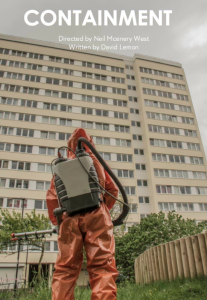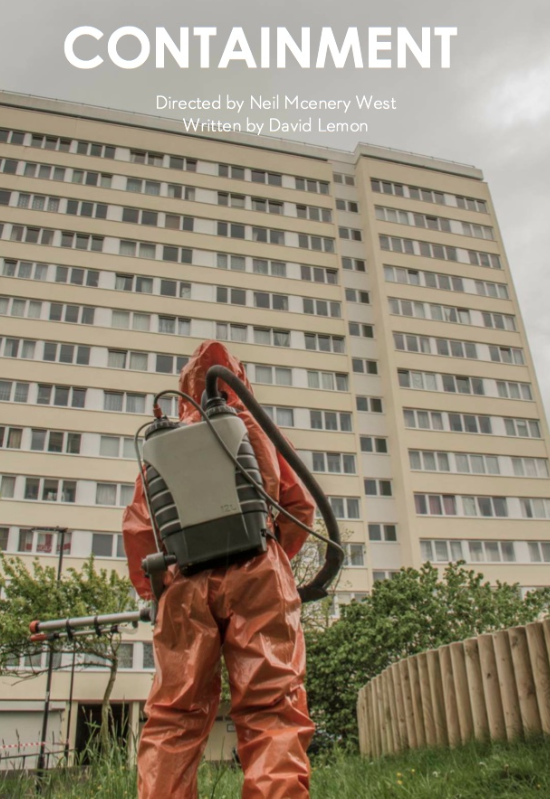 Containment is the debut feature of British director Neil Mcenery-West. The plot centres around artist Mark, who wakes one morning to find the doors and windows of his flat have been sealed shut. Initially assuming it’s a prank, he’s more concerned with getting out to keep an appointment with his son. Far from being a prank, it quickly becomes clear that the entire block of flats has been subjected to the same measures. Mysterious hazmats are circling on the ground outside, and Mark witnesses other residents being dragged from the building into tents. It becomes apparent that there has been some sort of viral outbreak, and when a bunch of Mark’s neighbours come crashing through his wall, they join forces to try to find a way out. Of course, tensions increase between the unlikely team as events outside escalate, and Mark must find a way to protect himself and other residents from elements both outside and inside the block of flats.
Containment is the debut feature of British director Neil Mcenery-West. The plot centres around artist Mark, who wakes one morning to find the doors and windows of his flat have been sealed shut. Initially assuming it’s a prank, he’s more concerned with getting out to keep an appointment with his son. Far from being a prank, it quickly becomes clear that the entire block of flats has been subjected to the same measures. Mysterious hazmats are circling on the ground outside, and Mark witnesses other residents being dragged from the building into tents. It becomes apparent that there has been some sort of viral outbreak, and when a bunch of Mark’s neighbours come crashing through his wall, they join forces to try to find a way out. Of course, tensions increase between the unlikely team as events outside escalate, and Mark must find a way to protect himself and other residents from elements both outside and inside the block of flats.
Containment aims for the cinematic ground occupied by modern classics like Danny Boyle‘s 28 Days Later, and the underrated Right At Your Door, with nods to Dawn Of The Dead and Rabid.
For a first-time, micro-budget thriller, there’s plenty to admire here. Almost no time is wasted getting into the plot, the whole film clocking in at a lean 77 minutes, while the low-budget aesthetic often lends a gritty, lo-fi feel to proceedings. There are, perhaps unsurprisingly, some fairly vast plot holes. How did the hazmats manage to seal shut the windows of high-rise flats? How did this growing situation not attract the attention of anyone beyond the block? Given the hightened-reality/suspension-
What is harder to forgive is the indulgence in cliché. The characters are beyond unoriginal, in fact you can almost list them before they smash their way through the walls of Mark’s flat. There’s the psycho, the coward, the nurse, the mute child, the bigoted-yet-wise old woman, and then there’s Mark, the salt-of-the-earth lead character, just trying to find a way out to get to his estranged wife and son. In this role, Lee Ross, best known for a couple of decades worth of solid TV and film work in the likes of Secrets And Lies, I.D. and Jimmy McGovern‘s Dockers, excels, bringing a believable and genuine performance to what could have been a pretty one-note character. If you’re going to rely this heavily on the conventions of the genre, then it falls heavily on the cast to elevate the material, and Ross mostly manages this. Unfortunately, same can’t be said for some of the other performances. Andrew Leung as the psychotic Sergei starts off menacing, but his accent and characterisations at times descend into something from a Catherine Tate sketch, while William Posthlethwaite as the cowardly Aiden simply annoys from the moment he’s on screen.
There is definite potential on display here. Mcenery-West’s direction is taught enough at times to suggest he might be able to do more with a slightly bigger budget and a better script, and there are glimpses of what the younger cast members might be capable of with better material (Postlethwaite is already a highly-regarded stage actor, as you might expect of a son of Pete). Alas, Containment falls short in its own right, delivering neither the social commentary of Ramero, or the body-horror of Cronenberg, and lacking enough raw, visceral thrills to make up for it. Hopefully Containement will, in the long run, serve as a curio, a glimpse into the burgeoning talents of those involved, who went on to do bigger and better things.




